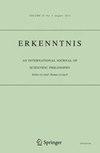不是一个好的解决方案:价值变化和分歧的构成主义
IF 0.8
2区 哲学
0 PHILOSOPHY
引用次数: 0
摘要
摘要:我们考察了汤姆森构成主义(thomsonsonian constitutivism)是否能令人满意地解释价值变化和分歧,这是一种元伦理学观点,它以“善固定类型”(即自己设定成为各自类型的好例子的标准)的方式来分析价值。虽然价值分歧一直被认为是一个重要的解释,但我们将价值变化作为一种密切相关但独特的元伦理利益现象引入。我们认为,建构主义未能解释这两种现象,因为它致力于“善固定”。立宪主义解释了分歧,最多只能解释新价值观的出现,而不是真正的变革。因此,对于现实主义在解释价值分歧和价值变化方面的问题,汤姆森的建构主义并不是一个很好的解决方案。本文章由计算机程序翻译,如有差异,请以英文原文为准。
Not a Good Fix: Constitutivism on Value Change and Disagreement
Abstract We examine whether Thomsonian constitutivism, a metaethical view that analyses value in terms of ‘goodness-fixing kinds,’ i.e. kinds that themselves set the standards for being a good instance of the respective kind, offers a satisfactory explanation of value change and disagreement. While value disagreement has long been considered an important explanandum, we introduce value change as a closely related but distinct phenomenon of metaethical interest. We argue that constitutivism fails to explain both phenomena because of its commitment to goodness-fixing kinds. Constitutivism explains away disagreement and at best explains the emergence of new values, not genuine change. Therefore, Thomsonian constitutivism is not a good fix for realist problems with explaining value disagreement, and value change.
求助全文
通过发布文献求助,成功后即可免费获取论文全文。
去求助
来源期刊

ERKENNTNIS
PHILOSOPHY-
CiteScore
2.10
自引率
11.10%
发文量
116
期刊介绍:
Erkenntnis is a philosophical journal publishing papers committed in one way or another to the philosophical attitude which is signified by the label ''scientific philosophy''. It concentrates on those philosophical fields which are particularly inspired by this attitude, although other topics are welcome as well. These fields are:- Epistemology - Philosophy of science, foundations and methodology of science in general and of natural and human sciences such as physics, biology, psychology, economics, social sciences in particular - Philosophy of mathematics - Logic, philosophy of logic, and all kinds of philosophical logics - Philosophy of language - Ontology, metaphysics, theory of modality - Philosophical psychology, philosophy of mind, neurophilosophy - Practical philosophy, i.e. ethics, philosophy of action, philosophy of law, etc. One of the objectives of Erkenntnis is the provision of a suitable platform for the discussion of controversial issues; another is the provision of timely, competent reviews of important publications in an ever-growing field of research.In recent years, philosophers standing quite outside the pale of analytic philosophy have also paid careful, and indeed most welcome, attention to precision of concept and language, to arguments, and to well-grounded foundations. Erkenntnis provides for them, and for philosophers of all persuasions, a place of meeting, of discussion, and of disputation.Erkenntnis was originally founded in 1930 by Rudolf Carnap and Hans Reichenbach, it was revived in 1975 by Carl G. Hempel, Wolfang Stegmüller, and Wilhelm K. Essler. You can find more information about this in the article “Hempel: The old and the new ‘Erkenntnis’” accessible in the tabs to the right.Today, Erkenntnis is one of the leading journals in philosophy worldwide and attracts first-class authors at all stages of career; from young philosophers at the PhD level up to established academic philosophers and highly renowned senior scholars. We pride ourselves on supplying our authors with substantial referee reports, subject to a turnaround time of about three months until the first decision. The acceptance rate for publications in the journal is presently slightly below 10%.
 求助内容:
求助内容: 应助结果提醒方式:
应助结果提醒方式:


